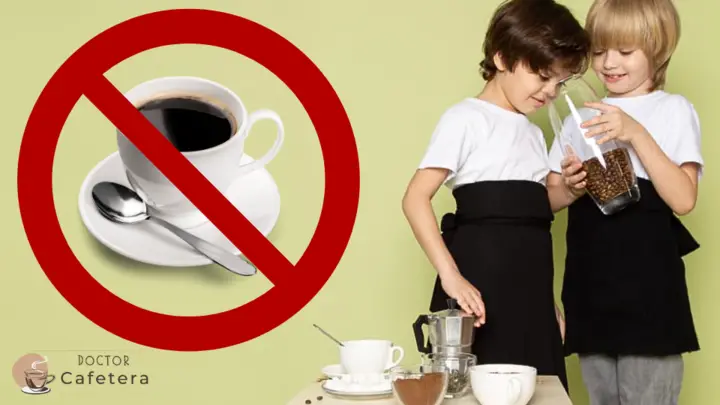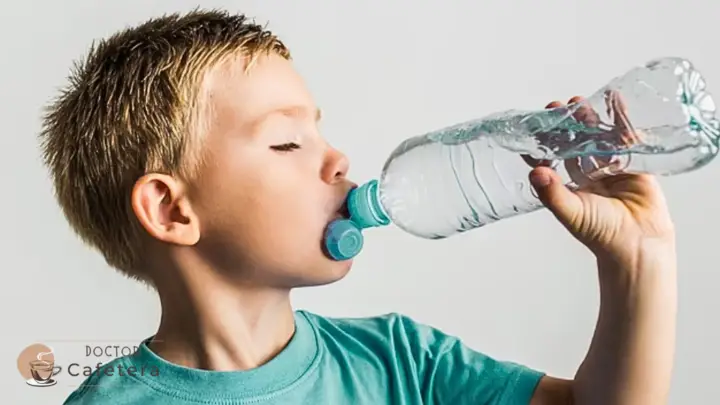In today’s society, the consumption of coffee is common and widely accepted. However, when it comes to children, the question arises of when it’s appropriate for them to start consuming this stimulating beverage.
One of the most notable characteristics of coffee is its caffeine content, a natural chemical compound that acts as a stimulant of the central nervous system in humans.
Physical and mental development in childhood
A child’s nervous system is constantly developing from childhood to adolescence. Children’s brains are particularly susceptible to external influences, including stimulants like caffeine.
Coffee is a nervous system stimulant that can affect alertness and concentration, also triggering reflux and anxiety. Since a child’s brain is still growing, early exposure to caffeine could significantly impact their brain development.
It’s important to recognize that children are not adults; their bodies are smaller, making them more sensitive to the effects of caffeine. What might seem like an insignificant amount of coffee for an adult could have overwhelming consequences for a developing child.
Suppose a child needs caffeine to function in their daily life. In that case, it’s advisable to seek professional help from a pediatrician to identify the root of the problem causing that fatigue.
Recommended age to start drinking coffee
There’s no universally accepted specific age at which it’s safe for a child to start consuming coffee or any other caffeine-containing beverage.
Currently, pediatricians discourage caffeine for children under 12 years old and advise against energy drink consumption for all children and adolescents. They also suggest limiting caffeine to a maximum of 100 mg (approximately two cans of cola) per day for those aged 12 to 18.
American Academy of Pediatrics
As children reach adolescence and their development approaches that of adults, their ability to metabolize caffeine also improves.
Note: Tolerance to caffeine can vary widely among children. Therefore, paying attention to each child’s reactions to caffeine is important.
Some children may be more sensitive to the effects of caffeine, experiencing nervousness, irritability, or difficulty sleeping even with small amounts. Other children may have a higher tolerance and not show immediate negative effects.
Effects of coffee on children
The intake of coffee can have several negative effects on children, including:
- Stimulation of the central nervous system leads to increased alertness and concentration.
- Possibility of causing nervousness, irritability, and even anxiety in some children.
- Interference with sleep, potentially resulting in insomnia and difficulty falling asleep.
- Potential to cause gastrointestinal problems, such as heartburn.
Healthy alternatives to coffee for children
When it comes to satisfying the need for energy and the desire for a tasty beverage, there is a range of healthy alternatives to coffee that may be more suitable and beneficial for growing children.
These options provide a dose of vitality, offer essential nutrients, and avoid the potential adverse effects of caffeine.
Fruit-Based Smoothies
Fruit-based drinks, such as smoothies, are an excellent way to provide children with energy without caffeine.
Smoothies can be a vitamin, mineral, and fiber-rich option. By blending fruits like bananas, strawberries, mangoes, or berries with milk or yogurt, you create a delicious and nutritious blend that can satisfy the desire for a tasty drink while providing health benefits.
Natural juices
Natural juices, especially those made at home from fresh fruits, can be a delicious way to provide nutrients and energy to children. However, it’s important to note that natural juices also contain natural sugars and calories.
Therefore, I recommend consuming them without sweeteners and in moderation. It’s important to prioritize whole fruit intake in young children to gain all the benefits of fiber and nutrients.
By opting for these healthy alternatives to coffee, parents can provide their children with nutritious options that meet their energy needs and contribute to their overall well-being.
Water
Nothing can replace the importance of staying hydrated. Water is essential for the optimal functioning of a child’s body and mind. Additionally, staying well-hydrated can help maintain energy levels and prevent fatigue.
Parents can instill healthy habits from an early age by encouraging regular water consumption.
Can a child drink decaffeinated coffee?
While decaffeinated coffee contains much less caffeine than regular coffee, there are still important aspects to consider before allowing children to consume it:
- Nutrition and Eating Habits: Whether decaffeinated or not, coffee is not a significant source of essential nutrients for children. Instead of including coffee in their diet, it’s preferable to prioritize beverages that provide nutritional value, such as milk, natural juices, fruit smoothies, and water.
- Sleep and Development Habits: Even though decaffeinated coffee has less caffeine, it can still affect the sleep and alertness of some children, especially if consumed close to bedtime. Quality sleep is essential for proper development and the overall well-being of children.
- Taste and Preferences: The taste of coffee may not appeal to children due to its bitter nature. Introducing children to milder flavors, such as those found in fruit-based drinks, may be more suitable and pleasant for their growing palate.
- Education about Stimulants: It’s important to teach children about making conscious and healthy food choices early on.
Conclusion
The decision of when to allow a child to start consuming coffee should be based on a deep understanding of the effects of caffeine on child development and health.
It’s essential to consider medical recommendations and educate children about the risks of consuming stimulants like coffee. By making informed and responsible decisions, parents



